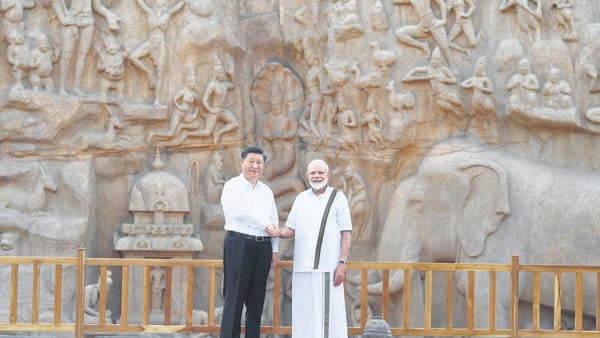
New Delhi: Chinese President Xi Jinping and Prime Minister Narendra Modi held “productive” talks with on Friday as part of the second India-China informal summit in the southern coastal town of Mamallapuram in Tamil Nadu, with both looking to chart a new course for bilateral ties over the next few decades despite a series of irritants that have cropped up between the two nations.
Xi, who arrived at the Chennai airport a little after 2pm on Friday, was welcomed by Tamil Nadu governor Banwarilal Purohit and chief minister Edappadi K. Palaniswami, among others.
The meeting is the third between the two leaders since Modi’s re-election as Prime Minister in May and the sixth since Modi and Xi sat down for their first informal summit in Wuhan last April.
Modi, dressed in a traditional veshti (dhoti/sarong), a white shirt and an angavastram, welcomed Xi, who was informally dressed in a white shirt and black trousers, when he arrived in Mamallapuram.

Modi took Xi to three iconic monuments in the historical coastal city—Arjuna’s Penance, Panch Rathas and the Shore Temple. The monuments date back to the Pallava era (4th-9th century CE). One of the reasons for choosing Mamallapuram was to highlight the contacts between the Pallava kings and China’s Fujian province where Xi served as governor once.
The two leaders witnessed a cultural programme at the temple complex before sitting down for a round of talks in the lawns of the Shore Temple complex. Modi later hosted a private dinner for Xi at the temple complex that rounded off the programme on Friday.
“Concluding a highly productive day with a pleasant conversation over a long dinner,” foreign ministry spokesman Raveesh Kumar said in Twitter post. “PM @narendramodi & Chinese President Xi continued their exchange of views on deepening of the India-China partnership over a breathtaking Kalakshetra cultural performance followed by dinner.”

Friday’s talks between Modi and Xi were aimed at building on the relationship reset that began in Wuhan in April last year.
People familiar with the visit said the summit’s informal structure helped provide an easy setting for the leaders to meet and discuss where they see India-China ties going over the next several decades. No agreements are expected, giving the leaders the time they need to discuss all the matters that they want to. The broad agenda included their unresolved border dispute, trade and people-to-people contacts besides regional and global issues.
A person familiar with the developments said the objective of the informal summit was to “ensure that communication between the leaders is one which is routinized, easy-going… it indicates that President Xi Jinping and Prime Minister Narendra Modi are getting down to business in an informal way, not simply in a structured summit…. but in a much more practical way of several hours of one-to-one discussion at which any subject can be discussed”.
Chinese ambassador to India Sun Weidong was quoted as saying by news reports that a “new set of consensus” including “guiding principles” on giving a new direction to the bilateral ties were expected after this weekend’s summit.
The countdown to the Friday-Saturday summit was clouded by a series of irritants including a statement by Xi telling Pakistan’s Prime Minister Imran Khan that he was watching the situation in Kashmir and would support Pakistan on issues related to its core interests. The comment was in the context of tensions between India and Pakistan after New Delhi scrapped a temporary provision in its constitution that gave special status to Kashmir and integrated the region more closely with India.

India has termed it as its internal matter and issued a sharp response to Xi’s comments, that was also notable for its timing—less than 48 hours ahead of Xi’s arrival in India. “India’s position has been consistent and clear that Jammu and Kashmir is an integral part of India. China is well aware of our position. It is not for other countries to comment on the internal affairs of India,” foreign ministry spokesman Raveesh Kumar said.
China, on its part, has been reportedly unhappy about Indian military exercises in Arunachal Pradesh, some 100km from the undemarcated border between the two countries. China claims the whole of Arunachal Pradesh as part of its territory.
The irritants surfacing in India-China ties ahead of the Mamallapuram summit have been in sharp contrast to the atmospherics ahead of the Wuhan meet last year. The announcement of the Wuhan meet had signalled a thaw in bilateral ties after the 73-day India-China military face off at Bhutan’s Doklam plateau in 2017. Modi had spent close to two days at Wuhan with Xi. In contrast, Xi is in India for less than 24 hours. He will be stopping over in Nepal for a visit on his way back to Beijing.
[“source=livemint”]





